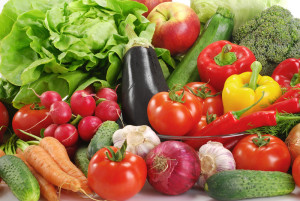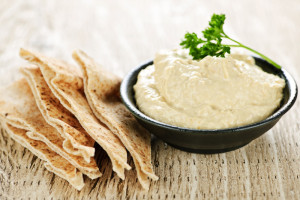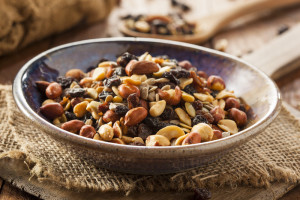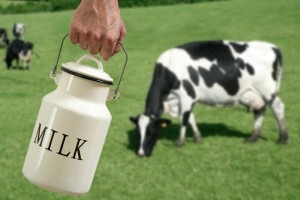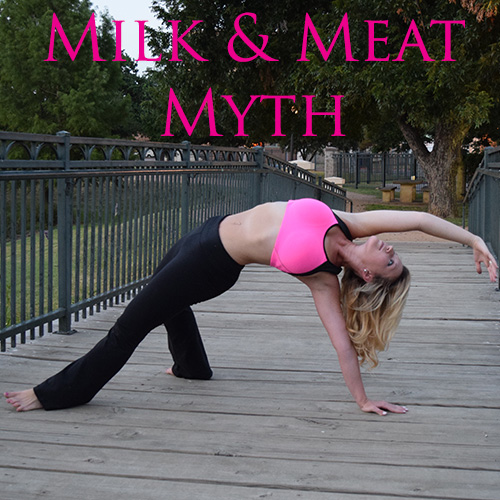
As I have been on this plant based journey – I have encountered many of the big concerns people have with this lifestyle. The big questions I get asked all the time has to do with getting protein and calcium without animal products.
Two concepts are deeply ingrained in the American diet:
1. We need huge amounts of protein and calcium in order to have strong muscles and bones
2. Protein = Meat and Calcium = Milk
These beliefs come more from popular culture than from science…so here is my response to some of the BIG vegan questions and misconceptions:
How much protein do I need?
The government daily recommended value for protein is 10-35% of daily calories – about 46 grams for women and 56 grams for men. These numbers are much less than the average American eats in a day. To put this in perspective, a small 8 ounce piece of steak has around 50 grams of protein – almost enough protein for the whole day for a man.
Now don’t get me wrong, protein is definitely an important macro nutrient, and certain special populations may need more for various reasons. However, because most Americans eat a lot of protein, AND most of this comes from animal products, this also means that meat and dairy make up more and more of the western diet. This results in not only an excess of protein, but also a great deal more cholesterol, calories and fat. In addition, because many animal product proteins are highly processed – hot dogs, bacon, or lunch meat for example – processed foods are increasingly high in our diet as well. Getting protein from plant based whole foods eliminates excess processed foods, cholesterol, and fat.
The documentary Forks Over Knives also highlights numerous studies that show serious health risks resulting from the intake of animal proteins. Links to growth in a variety of cancers and other diseases are serious and scary connections with the consumption of animal products. For more specific information about these read this blog from the Forks Over Knives Website or watch the incredible documentary on Netflix.
What is a complete protein?
The definition of a complete protein is one that contains all the essential amino acids. There are 20 amino acids, and 9 that the body does not produce on its own – these are called the essential amino acids because we need to get them from outside sources. A complete protein continues these 9 essential amino acids that our body needs. Meat and dairy are complete proteins, but eating a combination of plants and grains can also create a complete protein. Here are some of my favorite vegan foods or combinations of foods that create complete proteins.
- Quinoa – this incredible grain is actually a complete protein on its own with 8 g of protein per cup serving.
- Soy – beware of highly processed varieties, but soy is a complete protein and can be made in so many different ways.
- Chia Seeds – these seeds can be made into chia pudding, blended into smoothies or added to your trail mix with 4 g of protein per 2 tablespoons.
- Rice and Beans – this simple and cheap combination is easy to make and together create a complete protein with about 7 g of protein per cup.
- Hummus and Pita – a classic and delicious combination, this pairing makes a perfect snack or lunch option and boasts 7 g of protein per serving (1 pita slice and 2 tablespoons hummus).
- Peanut Butter Sandwich – the combination of whole wheat bread and peanut butter has around 15 g of protein with 2 slices of bread and 2 tbs of peanut butter.
Do I need milk for strong bones?
Americans also strongly believe in the connection between milk and calcium, and calcium and healthy bones. The recommended daily value of calcium is 1,000 – 1,200 mg, however new research shows that milk is not actually the key to strong bones, and milk intake actually leads to calcium loss from the bones. Super ironic right?
Here is a short breakdown of how it happens. Milk, like most animal products, increases the pH level in our bodies. Because calcium is a good neutralizer, the body will start to pull calcium out of the bones to help correct the pH level in the body. Once the pH level is normalized, that calcium is excreted through the urine. As a result, milk actually causes calcium loss in our bones. Evidence of this is shown by the fact that countries with a low consumption dairy products, also have very low fracture rates. To learn more specifics about this research, here is a great article about the connection between milk and calcium loss >> Click HERE!
Can I get calcium without milk or vitamins?
Calcium is a mineral found in soil, and absorbed into plants. As a result there are many great plant strong ways to get calcium that do not include eating animal products. Here are some of my favorite calcium rich plant based foods.
- Oranges – 65 mg, 1 Medium Fruit
- Kale – 188 mg, 1 Cup
- Bok Choy – 74 mg, 1 Cup
- White Beans – 191 mg, 1 Cup Canned
- Dried Figs – 107 mg. 8 Dried Figs
- Black Eyed Peas – 185 mg, 1/2 Cup Canned
- Almonds – 72mg, 1/4 Cup
- Seaweed – 126mg, 1 Cup raw
- Fortified Soymilk – 300mg, 1 Cup
- Firm Tofu – 861 mg, 1/2 Cup
Another important thing to consider is how much of the calcium we eat actually gets absorbed. Absorption rate of calcium goes down with excess levels of sodium, protein and caffeine in the body. Also, certain sources of calcium are more readily absorbed than others. Cow’s milk has an absorption rate of only 30% whereas Chinese mustard greens have an absorption rate of 40% and bok choy and kale have absorption rates of 50-60%. (Why You Don’t Need Dairy For Calcium, Rosane Oliveira PHD)
New research also points to the importance of vitamin D in increasing the absorption of calcium in the body. Our bodies can get vitamin D in three ways: from the skin, from what we eat and from supplements. Certain brands of soy or almond milk, orange juice and cereals are fortified with vitamin D and certain mushrooms are also a good source. Daily recommended values of vitamin D vary greatly based on age – if you want to know more talk to your doctor or nutritionist.
With research increasingly showing health risks associated with animal products, we all need to make a choice for our bodies that will lead to our best, heathiest life. I want to challenge all of you not to just blindly believe what you have heard over the years or what you see on TV in food commercials. Take the time to research for yourself and make healthy decisions for you!
I am not a doctor, nutritionist or scientist, but I wrote this blog to shed some light on the main questions and concerns I have encountered during my plant based, vegan challenge. If you have specific questions or health concerns, always talk with your physician or nutritionist. What are your thoughts on this? Share below!
* None of these statements or suggestions are meant as medical advice, or as substitute for a medical professional or dietician. If you have specific questions, please speak with your physician.


